Mexico Trips Give Chance for Experience, Empathy, Engagement
Volunteering at Rocky Point Medical Clinics has fostered new global health alliances for Health Sciences students and faculty.
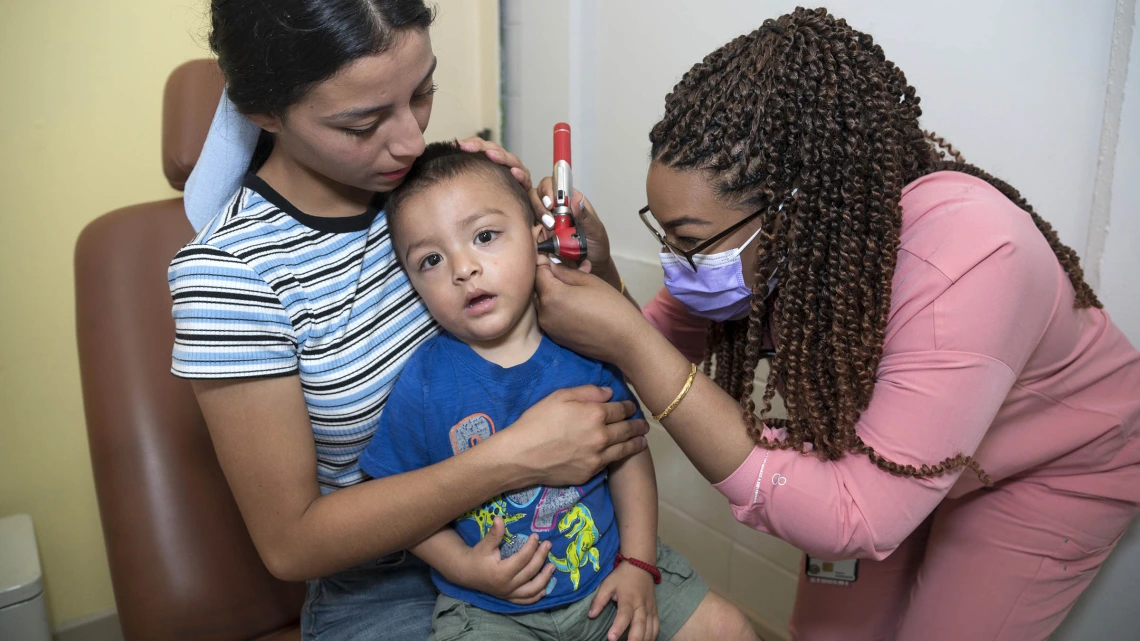
College of Medicine – Tucson student Leenda Osman checks a young patient’s ear at the Rocky Point Medical Centers in Puerto Penasco, Mexico. Volunteers from the MexZona student group at the College of Medicine – Tucson and the Migrant Health Interest Group and Global Health Program at the College of Medicine – Phoenix provide free clinical services to underserved patients in marginalized communities.
Puerto Peñasco, Mexico, is a popular vacation destination for U.S. tourists, who simply call it Rocky Point. A few miles from the beach homes, condos and resorts lies Barrio San Rafael, one of the coastal city’s poorer neighborhoods and site of the Rocky Point Medical Clinics.
There, students and volunteer clinicians from the University of Arizona Health Sciences get a chance to help, teach and gain clinical experience while learning about global health issues in underserved, marginalized communities. Since 2010, the Rocky Point Medical Clinics, and a sister clinic in Sonoyta, Mexico, have partnered with the MexZona student-led clinical program that’s part of the Commitment to Underserved People (CUP) Program at the UArizona College of Medicine – Tucson.
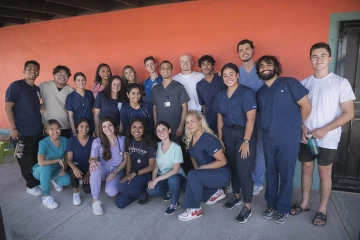
UArizona Health Sciences students and other volunteers gather at Rocky Point Medical Clinic for a weekend mission of providing free medical services to patients in an underserved neighborhood in Puerto Peñasco, Mexico, also known as Rocky Point.
Cristobal Reyes, a pre-med senior majoring in biochemistry and physiology, is MexZona’s president. Born in Tucson, he grew up in Oaxaca, Mexico, and returned to Tucson for high school. A friend introduced him to MexZona during his first year in college, only months before COVID-19 emerged. The clinics stayed open throughout the pandemic.
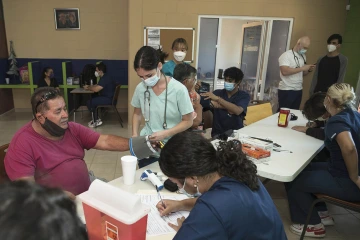
University of Arizona pre-med students take vitals before patients can see a doctor.
Rivero, a former Arizona state legislator, works with medical colleges and others to assure proper physician, nurse and specialty care staffing of the clinics. On average, MexZona provides 15-25 student volunteers for the monthly weekend clinics, which draw anywhere from 150 to 200 patients at Rocky Point and about 60 at Sonoyta.
All skill sets utilized
The MexZona student leadership team includes third-year undergraduates Gina Hoskin, vice president, and Lillian Wu, executive administrator. Wu, from Corvalis, Oregon, is studying biomedical engineering and aiming for an MD-PhD program in medical school. Hoskin, of Mesa, Arizona, wants to be a pediatrician.
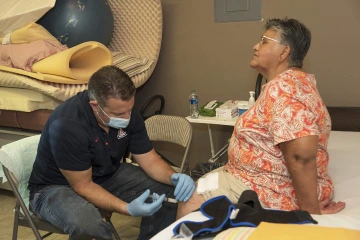
College of Medicine – Tucson clinical assistant professor of orthopedic surgery Michael Miller, MD, injects a patient’s knee.
Wu and Hoskin said volunteers come from the University of Arizona’s Tucson or Phoenix campuses, as well as Arizona State, Creighton and A.T. Still universities. Most, though, are pre-med and medical students from the College of Medicine – Tucson. Volunteers get paired with health providers including surgeons, doctors, nurses, dentists and physical therapists. Depending on the student’s skill set, they might help screen, triage and care for patients, or translate for patients.
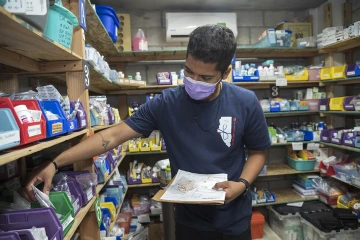
University of Arizona pre-med student and MexZona president Cristobal Reyes Cuevas works in the pharmacy at the Rocky Point Medical Clinic.
Separately, MHIG leaders Maeliss Gelas, Paulo Peña and Natalie Nabaty say their group has taken part in Tijuana refugee medical missions at Thanksgiving, coordinated health screenings in Phoenix for asylum-seeking immigrants and hosted clinics in Phoenix, first through Phoenix Allies for Community Health and now with the Saint Vincent de Paul Society. In April, MHIG joined the Rocky Point and Sonoyta clinics, in partnership with MexZona, to explore expanding the group’s outreach.
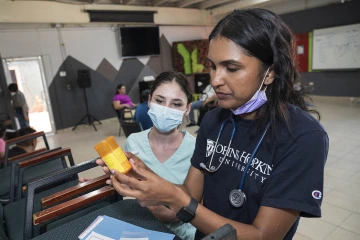
University of Arizona student Chloe Wall (left) watches as College of Nursing graduate Limya Mathew double checks a medication that will go to her patient.
Nabaty and Cailin Callahan, a 19-time MexZona volunteer and recent graduate of the UArizona Mel and Enid Zuckerman College of Public Health, created the initial bridge between Rocky Point Medical Clinics, MHIG and the College of Medicine – Phoenix. And Nabaty, a Phoenix global health certificate of distinction student, introduced the Rocky Point clinics to the college’s Global Health Program, which offers a certificate of distinction in global health.
Clinics are a bridge to doctoring
The Global Health Program, led by director David Beyda, MD, chair of the Department of Bioethics and Medical Humanism, held its inaugural clinics with Rocky Point Medical Clinics the third week of May. They were run exclusively with UArizona faculty including Dr. Beyda, Amy Christensen, MD, Robert Londeree, MD, and Teresa Mills-Murdock, MD, and 17 first-year medical students.
“This clinic is the exact reason why I wanted to go into medicine.”
Limya Mathew, BSN, RN
“Our charge was not necessarily to go down and do a slam dunk on seeing as many patients as we could. It was to learn how to use doctoring skills with empathy and compassion without understanding what the other person is saying to you,” Dr. Beyda said. “We learned simple things like what a privilege it is just to hold the hand of someone who comes to you for help. Our students were very much engaged in learning what it meant to be a servant.”
Dr. Beyda said the Rocky Point clinics offer a stable, accessible medical home for the program. The Dominican Republic hosted it previously for several years, but travel restrictions around the COVID-19 pandemic made that untenable. His team will make another trip to Mexico in September, he added.
Sommer Aldulaimi, MD, a College of Medicine – Tucson physician in the Department of Family and Community Medicine, has been on a multitude of medical missions as co-director of the college’s Global and Border Health Program. She said the clinics also count toward Tucson medical students’ global health distinction track, as well.
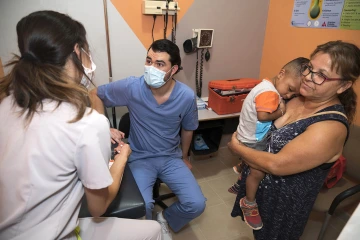
University of Arizona College of Medicine— Phoenix student Jorge Gonzalez consults with a patient’s family at the Rocky Point Medical Center.
Limya Mathew, BSN, RN, a May graduate of the College of Nursing, took part in a half dozen Rocky Point clinic trips since her first in December 2020.
“This clinic is the exact reason why I wanted to go into medicine,” said Mathew, who starts in August at the Johns Hopkins Hospital as a cardiovascular surgical intensive care nurse. “It provided me the perfect chance to give back to underserved communities. I learned a vast amount about rural medicine and how to work with little or no resources. I feel so much gratitude, and the patients constantly tugged at my heartstrings and amazed me with their resilience. They were so grateful and joyous to have us there. I always left wishing I could do more.”

